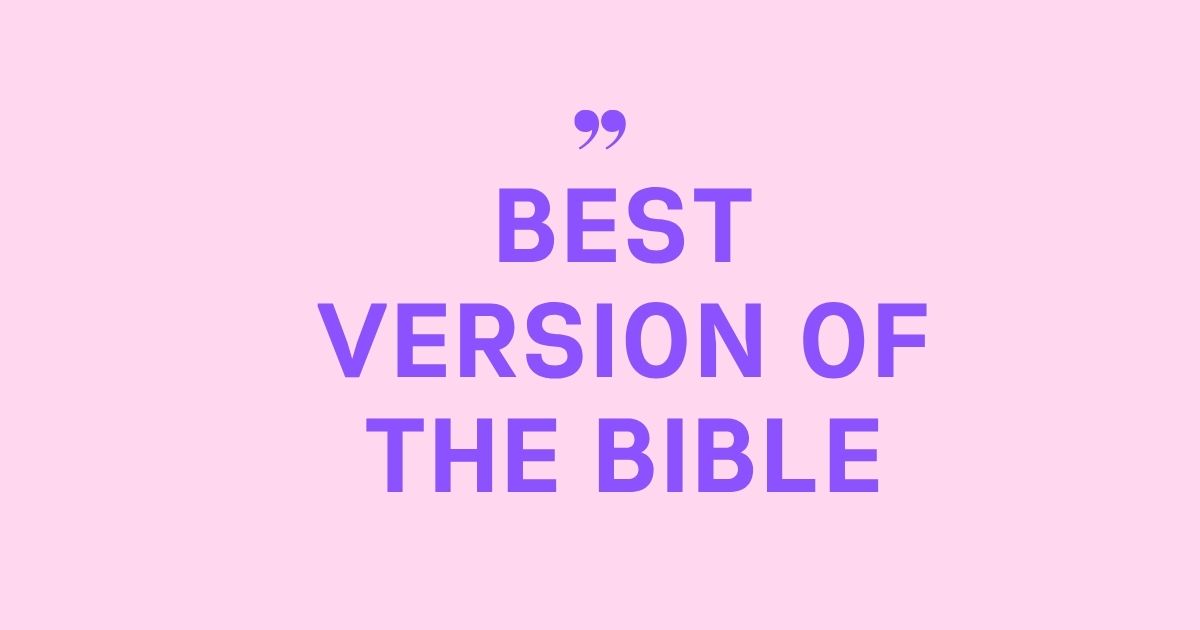Are you wondering what is the best version of the Bible to read? You’re not alone. Many people ask, “what’s the best version of the Bible?” or “which is the best version of the Bible?” because they want to understand God’s Word clearly. The truth is, the best version of the Bible is the one that helps you grow closer to Jesus Christ and strengthens your faith.
Some readers love the beauty of the King James Version, while others prefer the modern English of the NIV or ESV. When you ask what is the best version of the Bible to read, it really depends on your heart, reading level, and purpose. This guide will help you find the best version of the Bible that speaks to you, fits your lifestyle, and transforms your walk with God.
Why Choosing the Right Bible Version Matters
Choosing the right Bible version matters because it shapes how you understand the Word of God. Each translation of the Holy Bible reflects a different translation philosophy — some focus on formal equivalence (word-for-word accuracy), while others use dynamic equivalence (thought-for-thought clarity). The version you choose can affect how clearly you hear God’s voice in Scripture, whether you’re reading the Old Testament, the New Testament, or the teachings of Jesus Christ and the Apostles.
When you pick the best version of the Bible, you choose how you’ll connect with truth, faith, and spiritual growth. A clear and faithful translation deepens your understanding, builds your belief, and helps you apply the Word of God in daily life. Simply put, finding the right Bible version helps you hear God’s message the way He intended.
How different translations shape your understanding
Different Bible translations shape your understanding of Scripture in powerful ways. Some, like the English Standard Version (ESV) or the New American Standard Bible (NASB), aim for formal equivalence—a word-for-word translation that stays close to the Hebrew Bible and Greek New Testament. These versions highlight accuracy and are great for Bible study, word studies, and exploring the canon of Scripture deeply.
Other translations, like the New International Version (NIV) or the New Living Translation (NLT), use dynamic equivalence, or thought-for-thought translation. They focus on readability and modern English, making the Word of God easier to understand. Even paraphrase translations like The Message (MSG) can help you see God’s love and the Gospel in a fresh way. Each translation offers a new lens—shaping how you experience truth, grace, and faith.
The impact of translation style on spiritual growth
The translation style of the Holy Bible can deeply influence your spiritual growth and how you connect with the Word of God. Some versions draw you into deep study, while others help you feel the message in everyday language. Here’s how each style can shape your walk with Jesus Christ:
- Formal equivalence (word-for-word) — Found in the English Standard Version (ESV), New American Standard Bible (NASB), and King James Version (KJV). These encourage deep reflection and a strong grasp of biblical accuracy.
- Dynamic equivalence (thought-for-thought) — Used in the New International Version (NIV) and Good News Translation (GNT). These bring clarity and make Scripture easier to apply in real life.
- Paraphrase translation — Examples include The Message (MSG) or the Living Bible. These simplify complex ideas, helping new believers understand faith, grace, and salvation more clearly.
Choosing the right Bible translation helps your heart and mind grow together—combining understanding with inspiration.
Top Contenders for the Best Version of the Bible

When people ask, “What is the best version of the Bible?” or “Which is the best version of the Bible to read?”, the answer often depends on your purpose—study, devotion, or spiritual growth. Each translation brings its own strength to how you understand the Word of God
James Version (KJV) – The Classic Standard
The King James Version (1611) remains one of the most beloved translations in history. Its majestic language and poetic tone have shaped English literature and Christian faith for centuries. Based on the Greek New Testament and Hebrew Bible, it emphasizes formal equivalence (a word-for-word translation). Though written in old English, many still find it inspiring for worship and study
New International Version (NIV) – Balanced and Modern
The NIV, published by Biblica, Inc., uses dynamic equivalence, blending accuracy with easy reading. It’s great for everyday Bible study, offering clear meaning without losing the essence of the original Scripture. For many believers, it’s the best version of the Bible to read daily because of its balance between readability and translation accuracy
English Standard Version (ESV) – Faithful and Readable
Produced by Crossway, the ESV strives for both precision and clarity. It’s based on the literal translation method, keeping close to the original biblical manuscripts. Many scholars and pastors choose it for teaching and serious study. It’s perfect if you want a trustworthy version that’s still easy to follow—a beautiful bridge between the NASB and the NIV.
New Living Translation (NLT) – Heartfelt and Accessible
The NLT, by Tyndale House Publishers, focuses on the emotional and practical side of Scripture. Using thought-for-thought translation, it helps readers grasp the message quickly. The NLT brings the Gospel to life in modern English, making it ideal for new believers or those looking for a more devotional reading experience.
The Message (MSG) – A Fresh Perspective for Today’s ReaderWhich
Written by Eugene Peterson, The Message is a paraphrase translation designed to make the Bible sound like natural speech. It’s not meant for in-depth textual criticism or academic study, but it’s a great companion for understanding how the Word of God applies to daily life. It helps readers feel the heart of Jesus Christ’s teachings in today’s language
Bible Version Best Fits Your Faith Journey?

For deep study and accuracy
If you love studying Scripture closely and want to stay true to the original biblical manuscripts, choose a formal equivalence or word-for-word translation. These versions focus on preserving every detail from the Hebrew Bible and Greek New Testament.
- English Standard Version (ESV) – Faithful, precise, and readable.
- New American Standard Bible (NASB) – Known for its translation accuracy and reliability.
- King James Version (KJV) – Classic and poetic, ideal for memorization and reverent reading.
These versions are perfect for Bible study, sermons, or anyone who wants to explore the deeper contextual meaning and inerrancy of the Word of God.
For daily devotional reading
If your goal is to feel the love of God and grow spiritually each day, choose a dynamic equivalence or thought-for-thought translation. These focus more on readability and emotional connection than strict literal wording.
- New International Version (NIV) – Balanced between accuracy and modern readability.
- New Living Translation (NLT) – Warm, clear, and relatable.
- Holman Christian Standard Bible (HCSB) – Easy to read yet rich in spiritual depth.
These are great for prayer time, personal reflection, or sharing the Gospel in your everyday conversations.
For new believers or casual readers
If you’re just starting your journey with Jesus Christ or want a simpler way to grasp the Bible’s teachings, a paraphrase translation or an easy-to-read version may be best.
- The Message (MSG) – Brings the Scripture to life in conversational language.
- Good News Translation (GNT) – Friendly, clear, and ideal for beginners.
- Living Bible – Simplified and engaging for first-time readers.
These translations make it easier to understand salvation, grace, and faith, helping you build a strong foundation in Christianity and discipleship.
Conclusion
Finding the best version of the Bible is a personal journey. Some people want accuracy, while others look for easy reading. You might ask, “Which Bible version is the best?” or “What is the best version of the Bible?” The truth is simple — the best one is the one you’ll actually read and live by. The most popular Bible translations like the ESV, NIV, and KJV each speak to hearts in different ways.
The most popular versions of the Bible have changed lives for centuries. The most popular Bible version for study may not be the best one for devotion. Read, pray, and let the Word of God guide you. The best version of the Bible is the one that helps you grow in faith and keeps you close to Jesus Christ every single day.

